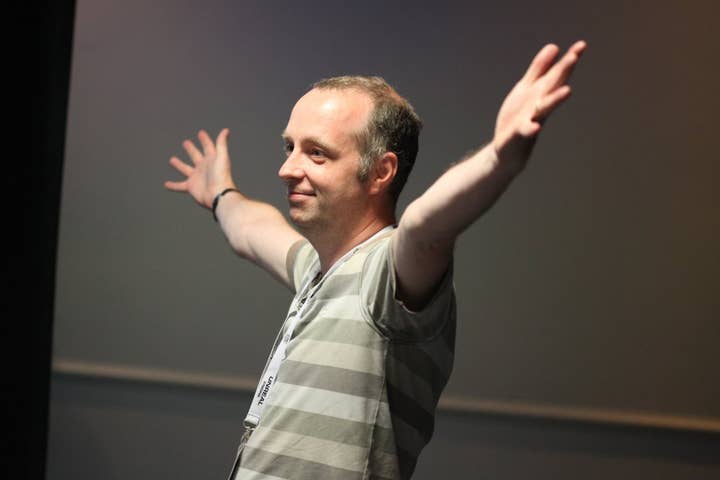"Nobody cares about performance in indie games any more"
Positech's Cliff Harris lit up GDC with a compelling - and occasionally profane - argument against the ubiquity of the Unity engine
Accessibility is one of the touchstones of the contemporary games business, and not just from the perspective of the consumer. It has never been simpler for anyone with the will to create and sell a game to do so, and, due to the ostensibly altruistic actions of three major companies, this year's GDC marked another milestone at in that process became easier than ever before.
Just as the world's most important developer conference kicked into high gear, Unity, Epic and Valve all announced versions of their engines that will remove yet more of the costs associated with licensing the tools of game development. Indeed, with one or two notable caveats, the Source, Unreal and Unity engines can be used for almost, or actually, nothing at all.
"We have to be edgy and cool because we're indies, but we never innovative on performance. We take Unity, and that's fine"
Anyone working in this industry for the last decade or so is likely to attribute this ongoing trend to one company: Unity Technologies, which was formed with the express purpose of 'democratising' game development. For a great many people working in the industry today that mission statement is the reason they are making games at all, and, taking a purely objective view, it has proved to be a powerful business model - both economically viable and germane to the times.
Generally speaking, Unity's rise to prominence has been one success story it's easy to feel good about. But there is another view, and as GDC's "Indie Soapbox" session drew to a close, Positech's Cliff Harris took the stage and expressed it with confidence and no small measure of biting wit.
At this point, a little context might be useful. The Indie Soapbox was composed of ten speakers from the indie development scene, the very community that Unity's iconoclastic mission has served so well. Each one had five minutes to detail a nagging concern, a driving obsession, a worrying thought, or pretty much anything else. The emphasis was on brevity rather than histrionics, and honesty most of all. There were talks about being a mother, dealing with failure, and drawing on life experience to make games more relevant. Cliff Harris, a British developer of 15 years standing, went with the following title: "Fuck Unity, and the horse it rode in on."
"You don't scare me," Harris said, smiling as the crowd responded with what can only be described as gleeful surprise. "I'm not really saying it's evil. Obviously, Unity's good in all kinds of wonderful ways." A loaded pause, a wider smile. "I hate it."
In his lifetime, Harris explained, Moore's Law has proved to be accurate. Computing power has rapidly increased while the cost of accessing that power has plummeted, to the point where the first games Harris played now seem rudimentary, even laughable. Bug-Byte's Manic Miner has many good qualities as a game, he said, but it "looked like shit" even in 1983. All games did, in fact, due to the limits on what was technically possible. "We can do incredible stuff these days," Harris reminded the audience, and yet the indie scene has become defined by a prevalent lack of interest in doing so.
"We don't care about how stuff works as much as we used to, and that makes me really sad. We just use what other people have written"
"My problem is that indie games still look like that. I mean, I get it: pixel art can be an aesthetic choice... But nobody cares about performance in indie games any more. We get a free pass. We have to be edgy and cool because we're indies, but we never innovative on performance. We take Unity, and that's fine. We never push it and write our own engines, or anything like that."
Harris, it should be noted, does write his own engines. Indeed, when he first became interested in game development that sort of technical understanding was a prerequisite. But in addition to being essential, it was also crucial to the appeal - to the mystique - of the job. Harris projected a slide depicting Q, a god-like entity from Star Trek who could manipulate the universe for his own ends and, often, amusement. He followed that with a photo of a young Bill Gates, nonchalantly tossing a floppy disc towards the camera. For Harris, there was something distinctly god-like about programming. You were the architect of a universe, the author of its rules and laws
"We used to be like that," he said. "There was hardware and there was us. We understood how it worked and nobody else did. It was this magic box that they didn't understand, but we understood everything.
"This is my problem with middleware, and I know not everybody feels this way, but suddenly we're not gods any more. We don't have control over the universe. We don't care about how stuff works as much as we used to, and that makes me really sad. We don't feel we need to master the bits and the bytes. We just use what other people have written.
"There are gods, and now we just license their engines."
Photograph taken by Dan Griliopoulos.

